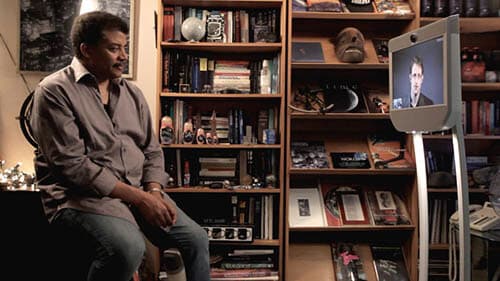
We’ve been working hard to create the best UFO, Alien & Paranormal stories for several years now and we’re excited to share that we just recently launched our youtube channel. We’re releasing one new alien, ufo video each day. Make sure to head over to the UfoHolic youtube channel, subscribe and tap the bell in the top right for notifications to see new videos when they come out. Subscribe to our Ufo videos by clicking here.
World-famous whistleblower Edward Snowden has finally given us the chance to hear what he has to say about aliens and his input has already been called depressing.
Last Friday, Snowden took part in Neil deGrasse Tyson’s StarTalk podcast and they discussed the subject of privacy. From an undisclosed location in Moscow, Snowden was able to communicate with deGrasse Tyson with the aid of a robotic video screen, which Tyson described as “an iPad on wheels.”
How would an alien want to communicate with us? Before trying to come up with an answer, we have to accept the presumption that said alien belongs to a civilization far more advanced than we are. Since all we can do is speculate, we need to consider our own development in communications technology as a reference point.
That’s when encryption becomes a problem.
With the right means, anyone can eavesdrop on an unencrypted communication. In our current state of development, we’ve learned the hard way that this situation is problematic. It makes sense to assume that an advanced alien civilization has also encountered this obstacle sometime during its history.
If you look at encrypted communication, if they are properly encrypted, there is no real way to tell that they are encrypted,” Snowden told deGrasse Tyson. “You can’t distinguish a properly encrypted communication from random behavior.”
This essentially means that we could be bombarded with extraterrestrial messages and we wouldn’t even be able to distinguish them from white noise. If an alien civilization has attained advanced status, it makes sense to assume they began encrypting their communications a long time ago. Whether they did it for the same reasons we do is yet another assumption. As Neil deGrasse Tyson points out, “whether they would have the same security issues as us” remains subject to conjecture.
If you have an alien civilization trying to listen for other civilizations or our own civilization trying to listen for aliens there’s only one small period in the development of their society when all of their communications will be sent via the most primitive and most unprotected means.”
This hypothetical situation would only allow for a limited time frame in which we could achieve any meaningful communication. Once an alien civilization chooses to encrypt its transmissions, the window closes. As Snowden bluntly put it, “all of their communications would be encrypted by default so anything we might intercept would be indistinguishable to us from cosmic microwave background radiation.”
Naturally, this theory is based solely on our human experience and technological evolution. If intelligent life were to evolve elsewhere in the universe, it wouldn’t necessarily share the same strengths and weaknesses we do. Being fundamentally different life forms brings up entirely different scenarios, including the ones where the need for secrecy never developed.
If these alien civilizations became advanced enough to have come up with encryption technology, there’s a chance they even mastered interstellar travel at some point. If so, their preferred method of communicating might be a tad more personal and along the lines of physical visitations and unexpected house calls.
Snowden’s expertise brings up an interesting approach to a decades-old question: where are all the aliens and why aren’t they contacting us?
Could this be the answer to the Fermi paradox?












Trackbacks/Pingbacks